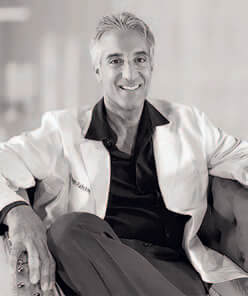
Alison O’Neil: Ben, can you introduce yourself, your professional and personal path?
Benjamin Knight Fuchs: I’m a registered pharmacist, specializing in dermatology and I’ve been compounding skin care formulas both prescription and nonprescription for nearly 40 years.
Alison O’Neil: How do YOU define Biomimetic?
Benjamin Knight Fuchs: Mimicking biology, the same as or analogous to molecules that are already in the body and skin.
Alison O’Neil: When did you learn about these ingredients?
Benjamin Knight Fuchs: Biochemistry 101 as biomimetic ingredients are simply molecules (and ultimately ingredients) that are already in the body and skin.
Alison O’Neil: What inspired you to learn more about them?
Benjamin Knight Fuchs: In my first year of pharmacy school, I took a course called Medicinal Biochemistry and fell in love with the therapeutic potential of molecules native and inherent to the body in skin.
Alison O’Neil: What makes working in the field of Biomimetics so exciting?
Benjamin Knight Fuchs: As a student of biology, particularly to biology of the skin, it’s an honor for me to be able to introduce the remarkable biochemicals that make the skin such a resilient and dynamic organ, to the nonscientific public.
Alison O’Neil: When did you first start using biomimetic ingredients in products?
Benjamin Knight Fuchs: As soon as started formulating prescription dermatological products in the late 1980s. I focused on the use of HIGH CONCENTRATION, biomimetic ingredients.
Alison O’Neil: Have products always been Biomimetic? If so, why is this term JUST now becoming more used?
Benjamin Knight Fuchs: Our understanding of the skin, specifically its components and its healthcare are advancing rapidly, and patients are becoming more sophisticated.
Alison O’Neil: What changes in the skin/skin con-ditions have you been most impressed by?
Benjamin Knight Fuchs: Tissue regeneration, healing, anti-inflammation, dramatic visual appearance of health and a glow of vitality without activating allergic or toxic reactions.
Alison O’Neil: Do Biomimetic ingredients require specific carrier systems?
Benjamin Knight Fuchs: Transdermal penetrants are helpful for carrying lipophilic Biomimetic ingredients and necessary for water soluble ones.
Alison O’Neil: How do they target specific cell functions in the skin?
Benjamin Knight Fuchs: They do not “target specific cell functions”, they target the cell which has had 3.5 billion years of evolution to determine how to target functions.
Alison O’Neil: Are there any cautions that chemists should be aware of when developing BMM products?
Benjamin Knight Fuchs: Some biomimetic ingredients can be unstable so utilizing forms of biomimetic molecules that have more stability is advisable.
Alison O’Neil: How is it best stated when referring to these actives? Biomimetic ingredients? Complete BMM products?
Benjamin Knight Fuchs: I just call them biomimetic ingredients as they are not all active (e.g., biomimetic esters which support transdermal penetration).
Alison O’Neil: Any outstanding factors that you think professionals should know?
Benjamin Knight Fuchs: The most important biomimetic actives are essential nutrients which many patients are deficient in.
Alison O’Neil: What could be done to make Biomimetics a more acknowledged tool in technology?
Benjamin Knight Fuchs: Education.
Alison O’Neil: Why is nature’s approach necessarily the best?
Benjamin Knight Fuchs: Nature’s approach implies familiarity and functionality and leverages the inherent wisdom of billions of years of cellular evolution.
Alison O’Neil: What is most challenging about Biomimetics?
Benjamin Knight Fuchs: Cost.
Alison O’Neil: Ben, what is your favorite biomimetic product and why?
Benjamin Knight Fuchs: Truth Biomimetic Mineral Mist, it’s effective, gentle, inexpensive, and very functional.
Alison O’Neil: Thank you, Ben. Nice speaking with you



